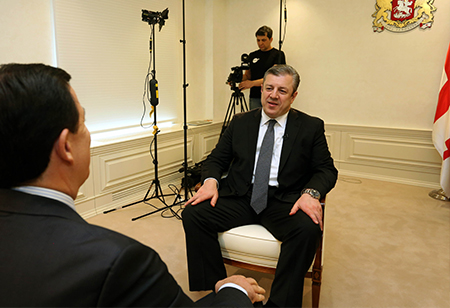CNNMoney: Georgia’s big plans for economic growth
6% growth in 2017 despite oil, currency crisis

Georgia is preparing for a huge boost in economic growth by setting goal to achieve 3.5 percent economic growth in 2016 and hit six percent in 2017.
In an interview with the world’s largest business website CNNMoney, Georgia’s Prime Minister Giorgi Kvirikashvili explained how he was going to push forward the Georgian economy when the country was suffering from low oil prices and facing a currency crisis.
A new four-point recovery plan, that includes new tax benefits, infrastructure plans, governance reforms and an overhaul to the education system, was the Georgian PM’s plan to increase economic development.
This year we plan for three percent to 3.5 percent growth, but [in] 2017 it will be 5.5 percent to six percent growth," Kvirikashvili told CNNMoney.
The national currency, the Georgian Lari (GEL) has depreciated by roughly 30 percent against the United States (US) dollar since the end of 2014. CNNMoney said the currency plunge was mainly caused by economic struggles in Georgia’s neighbouring major oil and gas producing countries – Russia and Azerbaijan.
But Kvirikashvili, who previously worked as Georgia’s Economy Minister told the magazine the crisis could have been "much worse”.
The International Monetary Fund (IMF) said Georgia still managed to experience two percent economic growth in 2015.
Watch the full interview here.
The Lari staged a small recovery this month. Looking head the IMF expected Georgia will post three percent and five percent growth this year and next, respectively.
CNNMoney reported Georgia was looking to become a go-to trade and logistics hub by offering low corporate taxes to European and US companies that were willing to enter into the "sometimes-volatile region”.
CNNMoney also accented Georgia was "ardently pro-European” after years of border disputers and conflicts with Russia. Georgia signed a free trade agreement with the EU in 2014 and the country had aspirations to join the EU and NATO.
Europe is a home for Georgia. We see Europe provides certain standards of democracy [and] human rights protection and this is what the Georgian people aim to achieve," Kvirikashvili told CNNMoney.
Kvirikashvili stepped into the role of Georgia’s Prime Minister in December 2015 and immediately started to actively reforming the business climate in Georgia.
A report by the International School of Economics (ISET) of Ivane Javakhishvili Tbilisi State University (TSU) in Georgia showed confidence within Georgia’s business society had grown in the first few months of 2016. For this reason ISET called the business confidence index increase the "Kvirikashvili Effect”.
 Tweet
Tweet  Share
Share